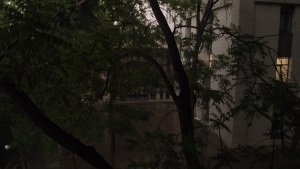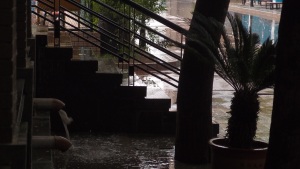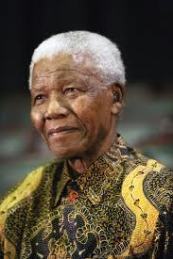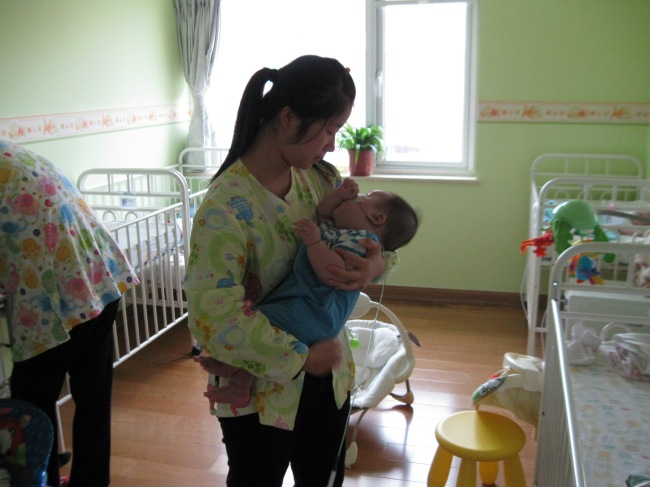This is surprisingly like my time here in Beijing.
HELENA-WEST HELENA, Ark. — If you are from around here, you know Doug Friedlander is not.
Born in New York City and reared on Long Island, Mr. Friedlander is Jewish and vegetarian and has a physics degree from Duke.
But here he is, at 37, living in a roomy white house in this hard-luck Delta town of 12,000. Mr. Friedlander and his wife, Anna Skorupa, are part of a gradual flow of young, university-trained outsiders into the Delta’s shrinking communities, many of whom arrived through Teach for America and stayed beyond their two-year commitment.
Mr. Friedlander is now the ambitious director of the county’s Chamber of Commerce. He frets over the kudzu that is devouring abandoned buildings. He attends Rotary Club meetings, where he sidesteps the lunch offerings for carnivores. He organizes workshops to modernize small businesses and pushes tourism and the development of a decimated downtown along the banks of the Mississippi.
The mechanization of agriculture, lost manufacturing and a legacy of poverty and racism have taken their toll on the Delta, but Mr. Friedlander is thrilled to be here. He left his job at a software company in North Carolina’s Research Triangle nine years ago, taking a two-thirds pay cut, to “make a bigger difference.”
To that end, “this is the most fertile soil on earth,” Mr. Friedlander said. “If I were in New York, I would be a leaf at the end of a branch at the end of a tree — in a forest.”
Mr. Friedlander arrived in 2004 to teach science at Central High School in Helena. He was one of 71 corps members in the Delta; currently, about 300 of them fan across the region’s classrooms each year, mostly in Arkansas and Mississippi.
Here, in towns like Helena, a former agricultural hub and river port, they find some of the most devastating poverty in the country: shacks on cinder blocks, schools with nearly all students on subsidized lunch programs.
Segregation is a fact of life. Private “white-flight academies,” as some locals call them, are common, leaving public schools to serve an overwhelmingly poor, black student body.
“I just knew when they left my classroom, it was an uphill battle for so many of my kids,” said Greg Claus, who is from Ohio and taught art at a public junior high school from 2008 to 2011. Now an assistant to the mayor of Greenville, Miss., he has seen the names of some former students on the police blotter. Several more are already parents.
Teach for America is fiercely competitive, drawing top graduates accustomed to success. “For most, this is the hardest challenge they’ve ever met,” said Luke Van De Walle, a 33-year-old corps alumnus from Indiana who has settled in Helena with his wife, Jamie, and their two young children. “They put a lot of effort in, and they get chewed up by 25 third graders.”
Still, some former members say they have never felt so satisfied.
Michelle Johansen, 37, arrived from the University of Michigan in 1997. Since then, she has become a volunteer manager at the farmers’ market in Cleveland, Miss. She works part time at Habitat for Humanity and is an adjunct instructor at Delta State University.
“I don’t want to leave,” said Ms. Johansen, who is married and has two children. “The work I’ve been able to do in the Delta is fulfilling.”
She does wish there were a Target in town. And a movie theater. There is no place to get brunch. But, she said, “there’s something about the Delta that’s very special, and if people are open to it, they will be captivated by it.”
Matty Bengloff, 28, is one of those people. He grew up in an apartment on the Lower East Side of Manhattan. Now he owns a three-bedroom home in Cleveland, as well as a hip new yogurt shop called Delta Dairy, with his fiancée, Suzette Matthews.
“The barriers here are low,” Mr. Bengloff said. “You can be really entrepreneurial. Everyone is eager to help.”
But the transition is not always easy.
Residents cured Mr. Bengloff of his Yankee ways. Soon after arriving in the South with Teach for America, Mr. Bengloff was in a school speaking to a receptionist. When he could not hear the man’s words, Mr. Bengloff asked, “What?” The receptionist said: “I can tell you’re not from around here. When you don’t understand something, you say, ‘Excuse me, sir?’ Or, ‘Sir?’ ”
Mr. Bengloff took the lesson to heart. Now his habitual use of “ma’am” irritates his mother back East. He drawls, “Thanks, y’all,” to customers passing through his shop.
Ms. Johansen and Mr. Bengloff said they were attracted to the quirks and complexity of the Delta.
They have found schools that are progressive and a complicated political scene. Ms. Johansen’s doctor is a catfish noodler (who fishes bare-handed). Shopping online is more necessity than convenience, though a two-hour jaunt to Memphis is common. The unofficial town motto, plastered on bumper stickers, is an ironic “Keep Cleveland Boring.”
No one, residents say, is too busy for a good chat.
“I know people who live in places with lots of things,” Ms. Johansen said. “Movie theaters. A Target. And they aren’t happy. I’m a happy camper.”
Mr. Bengloff, who is Jewish, found what locals call a “church family,” led by a retired rabbi who commutes from Memphis once a month. Just as many of the temple regulars are Christian as are Jewish, just because they like the diversity of experience and, said Mr. Bengloff, “the rabbi is great.”
Some longtime residents initially resented the inflow of Teach for America members with fancy degrees and backgrounds. Those troubles have largely eased over time. And the hard truth is, the Delta needs the people.
“It’s good having highly educated folks coming back,” said Chuck Roscopf, a lawyer in Helena. “My kids, my friends’ kids — they’re all gone. They’re in Dallas or just about anywhere else, but they won’t come back.”
Teach for America entered the Delta in 1992, when it dispatched a few dozen corps members to Helena and Marianna, Ark. The numbers and geographic reach expanded steadily but exploded in 2009 because of an influx of funds from the State of Mississippi and the Walton Family Foundation.
The organization now estimates that over those years, 250 corps members have stayed on after their two-year commitments were over. Some have remained in education; others found jobs in private industry and community organizations.
They have started education-based nonprofit groups, like Mississippi First and the Sunflower County Freedom Project. Mr. Friedlander and Ms. Skorupa, with other Teach for America alumni, were founding board members of a new Boys and Girls Club in Helena.
Mr. Friedlander remains a hard-charging New Yorker, which has rubbed some folks the wrong way.
“If he was just here to make money, they probably would have run him out of town,” said Jason Rolett, the executive director of the Boys and Girls Club of Phillips County. But Mr. Friedlander has won the trust of much of the community, Mr. Rolett said, “because of his heart, how much he cares.”
Mr. Friedlander enjoys ripping through a PowerPoint presentation of Helena’s new health center, riverboat tours, renovated historic buildings, a downtown emerging from ruin and new businesses. His pride is palpable.
Helena even has its first director of an advertising and promotion commission, Julia Malinowski, 27, from Seattle.
Word is spreading beyond the Teach for America crowd.
Recently, graphic designers opened a firm called Thrive in Helena after living for five years in Brooklyn, where “about 200,000 people were trying to do what I wanted to do,” said a co-owner, Terrance Clark.
He has had enough work in the Delta to hire two interns from Midwestern design schools this summer. And Mr. Clark has recruited a group of friends from Indianapolis to come to Helena to work on community projects under his company’s 501(c)(3) umbrella.
Mr. Clark, Ms. Malinowski and the rest work together in a chic business incubator downtown.
The space is airy and open, with interior brick and a glass conference room — sort of like what you would find in Brooklyn.





